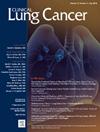他汀类药物联合免疫检查点抑制剂与非小细胞肺癌患者的生存率
IF 3.3
3区 医学
Q2 ONCOLOGY
引用次数: 0
摘要
目的:确定他汀类药物联合免疫检查点抑制剂(ICIs)与非小细胞肺癌(NSCLC)患者肺癌特异性和总体死亡率之间的关系。材料和方法:采用SEER-Medicare对2007年至2017年间接受ICI治疗的≥65岁诊断为NSCLC的Medicare受益人进行回顾性研究。患者从第一次ICI索赔之日起随访至死亡,从最后一次ICI索赔之日起1个月,或2018年12月31日,以先到者为准。使用Cox模型对人口学、病理、治疗相关因素和他汀类药物使用倾向评分进行调整,估计时间更新后他汀类药物使用与肺癌特异性死亡率和总死亡率之间的关系。结果:在1,401例患者中,与未使用他汀类药物的ICI患者相比,同时使用他汀类药物的任何ICI患者的肺癌特异性死亡率风险降低41% (HR = 0.59;95% ci = 0.35-0.99)。他汀类药物的使用同样与较低的总死亡风险相关(HR = 0.62;95% ci = 0.41-0.94)。当限制使用PD-1抑制剂和他汀类药物时,观察到一致的负相关。有限的抗pd - l1治疗阻止了该亚组的分析。结论:在以人群为基础的老年非小细胞肺癌患者样本中,他汀类药物与ICIs同时使用与肺癌特异性和总体死亡率降低相关。未来的工作需要在前瞻性研究和随机试验中证实这些发现,包括评估他汀类药物与一线ici的并发使用,破译潜在的机制,并确定他汀类药物与ici的最佳组合,以最大限度地提高临床效益。本文章由计算机程序翻译,如有差异,请以英文原文为准。
Statin Use With Immune Checkpoint Inhibitors and Survival in Nonsmall Cell Lung Cancer
Objective
To determine the association between concurrent statin use with immune checkpoint inhibitors (ICIs) and lung cancer-specific and overall mortality in patients with nonsmall cell lung cancer (NSCLC).
Materials and Methods
SEER-Medicare was used to conduct a retrospective study of Medicare beneficiaries ≥65 years of age diagnosed with NSCLC between 2007 and 2017 treated with an ICI. Patients were followed from date of first ICI claim until death, 1 month from last ICI claim, or 12/31/2018, whichever came first. Associations for time-updated statin use and lung cancer-specific mortality, and overall mortality were estimated using Cox models adjusted for demographic, pathological, treatment-related factors, and a propensity score for statin use.
Results
Among 1,401 patients, concurrent statin use with any ICI was associated with 41% lower risk of lung-cancer specific mortality compared to patients receiving ICI not using a statin (HR = 0.59; 95% CI = 0.35-0.99). Statin use was associated with a similarly lower risk of overall mortality (HR = 0.62; 95% CI = 0.41-0.94). Consistent inverse associations were observed when restricting to PD-1 inhibitors and by statin type. Limited anti-PD-L1 treatment prevented analysis in this subgroup.
Conclusion
Concurrent statin use with ICIs was associated with lower risk of lung cancer-specific and overall mortality in a population-based sample of older patients with NSCLC. Future work is needed to confirm these findings in prospective studies and randomized trials, including evaluating concurrent statin use with frontline ICIs, deciphering the underlying mechanism, and determining the optimal statin-ICI combination that maximize clinical benefit.
求助全文
通过发布文献求助,成功后即可免费获取论文全文。
去求助
来源期刊

Clinical lung cancer
医学-肿瘤学
CiteScore
7.00
自引率
2.80%
发文量
159
审稿时长
24 days
期刊介绍:
Clinical Lung Cancer is a peer-reviewed bimonthly journal that publishes original articles describing various aspects of clinical and translational research of lung cancer. Clinical Lung Cancer is devoted to articles on detection, diagnosis, prevention, and treatment of lung cancer. The main emphasis is on recent scientific developments in all areas related to lung cancer. Specific areas of interest include clinical research and mechanistic approaches; drug sensitivity and resistance; gene and antisense therapy; pathology, markers, and prognostic indicators; chemoprevention strategies; multimodality therapy; and integration of various approaches.
 求助内容:
求助内容: 应助结果提醒方式:
应助结果提醒方式:


